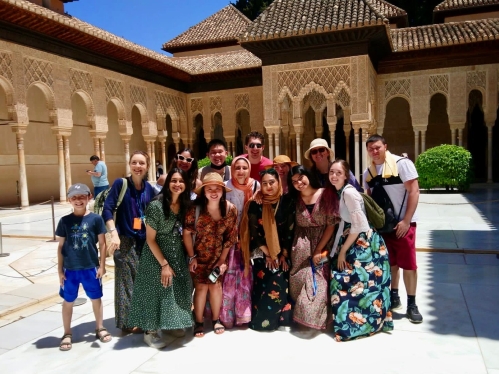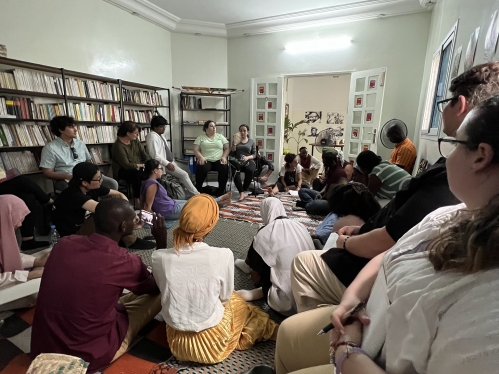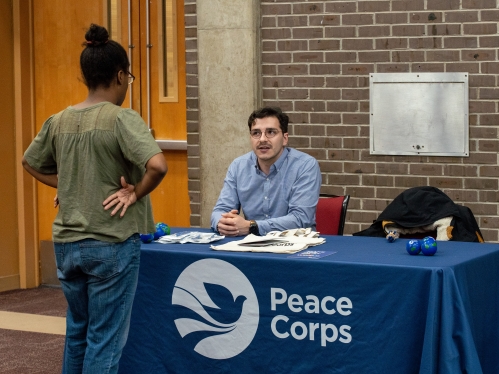
Ani Aravindan

Students
Getting Started
Which program is right for me? Questions to ask yourself…

Find your programs
Explore our available programs on our website. Search by term, subject, or location. Pay attention to possible GPA or language requirements (common for programs in Spain or Japan) and possible prerequisites (sometimes necessary for short-term programs).

Types of Programs
These programs are total immersion experiences that allow you to enroll in a local university or provider study center for a semester or the full academic year.
Summer programs are short-term experiences that run during the summer terms. They consist of:
For both options, you will have the chance to expand your network and experience local cultures with fellow students. You may also be able to utilize financial aid.
Winter programs are short-term structured programs that run over winter break. They are created and led by Rutgers faculty or through a program provider. These programs have set courses that may fulfill major, minor, and/or elective requirements. They also allow you to experience local cultures with fellow students.
These programs are 3-credit Spring/Fall courses that include an international, 1-credit travel component that happens during term breaks or right after terms. Some embedded opportunities only consist of the 1-credit international travel experience and do not require students to be enrolled in a Spring/Fall class.
They are created and led by Rutgers faculty.
Finances
Questions about paying for study abroad? Learn more about finances, scholarships, and other special access initiatives that help cover costs.

Application
Create and submit your study abroad application by the deadline. (Please check out the Program Information page to see the exact deadline.)

Program Term |
Deadline |
|---|---|
Summer*Fall*Academic Year* |
February 1 or March 1 |
Fall Embedded |
August 1 |
Winter |
October 1 |
Spring* |
September 1 or October 1 |
Spring Embedded |
December 1 |
*Chek program information pages for specific deadline dates.
Some programs have limited spots, and applications are reviewed on a rolling basis. Please contact your Study Abroad Advisor for more details.
Program Deposit
Pay the required post-acceptance program deposit. This is due within 2 weeks after the application deadline.

Travel, Health & Safety
The safety and well-being of Rutgers students abroad is Rutgers Global's top priority. Once admitted to a study abroad program, we provide students with in-depth information on program location, instructions for how to prepare for a program and its locale, and tips and suggestions for how to remain safe and healthy throughout the study abroad experience abroad.

Parents & Families
What do your parents and family need to know about your study abroad experience? Learn more here.

Study Abroad Policies
All program participants will be held to a unified list of expectations for participation in a Rutgers Global study abroad program. After you have been accepted to a study abroad program and paid the required deposit, you are considered an enrolled participant in that program and will therefore be held to the terms and conditions of all policies that are a part of the study abroad application and post-decision process.
The following agreement holds all program participants to a unified list of expectations for student participation in a Rutgers Global study abroad program. Once enrolled, all students, regardless of their home institution, are considered Rutgers students.
Participation and Financial Commitment
Once accepted into your chosen study abroad program, you will need to commit to that program by paying a non-refundable deposit.
In doing so, you are again agreeing to the policies outlined in the Participation Agreement, and you are agreeing to the financial obligations outlined there as well. (Note: You will be directed to read the RGSA Participation Agreement multiple times throughout the application cycle. It is important to understand the policy before committing to a study abroad program.)
Post-Acceptance Withdrawal Process
If you decide to withdraw after you pay your deposit to a study abroad program, you must take the following steps:
Steps RGSA will take after your withdrawal form is received:
RGSA will withdraw your application from our application system. We will cancel your international health insurance, adjust your study abroad registration (if enrolled), rescind any RGSA scholarships awarded to you for participation in a study abroad program, and notify the Registrar and Student Accounting.
If your total financial obligation for the program is greater than the amount already paid, a financial hold will be placed on your account.
Types of Withdrawals
There are two different types of withdrawal: Student withdrawal and an RGSA withdrawal. The following describes various types under each category:
Appeal Policy and Process
After completing the Withdrawal Process, students with extenuating circumstances can file an appeal by taking the following steps:
Guidance for completing your appeal:
Take the process seriously. You can only appeal financial penalties once and must do so within 10 business days of your withdrawal.
Consider the basis of your appeal. You must appeal based on circumstances beyond your control. Examples of qualifying extenuating circumstance and required supporting documentation for consideration include:
Be consistent. The University will compare the information submitted in the appeal form with many sources of information including but not limited to: verbal discussions, email correspondence, forms that were submitted, application materials, and the information provided in your withdrawal form. Discrepancies may undermine your appeal.
Cancellations by RGSA: In the event that Rutgers Global–Study Abroad (RGSA) cancels a program, students will be refunded deposits paid to RGSA. Deposit or Application fees paid to providers or host university are not eligible for RGSA refunds.
Note: Students who choose to cancel their own participation see below.
Special note about Flight and Travel Insurance: Rutgers Global–Study Abroad will notify students when it is the appropriate time to purchase flights. Once students are given this recommendation, all flight reservations should be made with the consideration of travel insurance and cancellation options. Flight and/or travel costs cannot not be refunded by RGSA should a cancellation occur. Please research travel insurance before purchasing a ticket and confirm it will cover cancellation or change of plans due to COVID-19 or any other reason.
Cancellations or Withdrawal by Students: In the event that a student makes the personal choice to withdraw and the program is not cancelled by RGSA or the University, no refunds will be given, and students will be subject to the current withdrawal policy and financial timeline outlined on our website.
Rutgers Global Travel Safety & Security (GTSS) provides the Rutgers community with guidance and advice, risk assessments, training, and other direct support related to international engagement and global mobility. The GTSS mission is to enable wider, more meaningful international engagement through programs and policies that promote informed worldwide risk mitigation.
Rutgers Global Travel Safety & Security (GTSS) supports University travelers by:
Rutgers University-Sponsored International Travel Policy
The International Travel Policy provides guidelines and information for faculty, staff, and students travelling internationally, including;
Have a question? Contact Rutgers, Global Travel Safety & Security (GTSS) at globalsafety@global.rutgers.edu if you have questions that are not addressed on the Rutgers Global or Risk Management websites! Please note that this inbox is monitored during business hours only.
Travel Petition for Higher Risk Destinations: You should use this form to document the necessary certification for travel to a destination requiring a petition under Rutgers University Sponsored International Travel Policy. Once completed, this form should be submitted as soon as possible and within 45 days of a proposed departure date.
Peace Corps
The Peace Corps is a 27-month long service opportunity for motivated U.S. citizens over 18 to immerse themselves in a community abroad and work alongside local leaders to tackle pressing challenges.
Rutgers and the United States Peace Corps have shared a history since 1961 when Rutgers was selected to serve as the training site for the original cohort of Peace Corps Volunteers to the Republic of Colombia. In 2015, Rutgers Global entered into an agreement with the Peace Corps to establish a Peace Corps Recruitment Office as a resource for the entire university. Meet our campus recruiter and learn more about this opportunity.

Returning from Study Abroad
Coming back to the United States after a study abroad experience can be as much of an adjustment as entering a new culture for the first time. We organize many events and programs for returned students.
